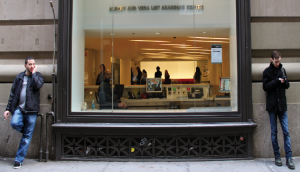Dean Search Fuels Dialogue on NSSR’s Future
The New School for Social Research is the longest-running asset of The New School. In the post-World War II era, few academic centers have gained greater renown. NSSR has employed the famed political theorists Hannah Arendt and Leo Strauss, the pioneering sociologist and civil rights leader W.E.B. Dubois, and the psychologist Erich Fromm, among many others. The writings and theories of its faculty members and its robust Ph.D program have built a reputation as one of the foremost progressive academic institutions in the country.
Faculty members and students warn that the division is at a pivotal moment in its history. With Dean Michael Schober’s contract finishing at the end of the semester, and a search for the next candidate underway, students have raised concerns about the school’s high costs, poor resources, and financial instability. Many students are hoping that their next dean articulates a clearer vision for the future.

In an interview with the Free Press, current Dean Michael Schober said that among other achievements, he is proud for integrating NSSR into the wider university. “I’d say that one success has been raising awareness around the university of the increasing involvement of NSSR faculty and students with the rest of the university,” he wrote.
Many students and faculty members had kind words to say about him. “He seemed very amenable to hearing our needs and issues and he was very responsive when we talked about things like enrollment in the Ph.D program,” Nadia Hashmi, an NSSR university student senator, told the Free Press. “So I thought he was a good person to go to bat for us on most things.”
But some students think he could have taken stronger stances during his two consecutive terms as dean. While not considering him a “poor” or “inadequate” dean, Marcello Kilani, speaker of the Graduate Faculty Student Senate, said, “There have been faculty complaints that he has not represented the NSSR’s interests strongly enough to the President and Provost. From my interaction with him I would not find this surprising — he is certainly more of a go with the flow kind of guy.”
When the GFSS heard that President David Van Zandt had begun his search for Dean Schober’s replacement, they wanted to bring student voices into the process. President Van Zandt had already asked faculty members to nominate five candidates. Soon after, they held another vote to narrow it down to three candidates.
Faculty members nominated William Milberg, Teresa Ghilarducci and Bill Hirst as the position’s top three contenders -— all current NSSR faculty members. While Van Zandt will make the final decision, faculty held more influence in this nomination process than in previous ones. There were no outside searches, and faculty members nominated all the candidates themselves.
The GFSS wanted representation as well. With the President’s approval, students held a public town hall meeting with the three candidates on January 29, and questioned each for about 30 minutes. Roughly 40 people attended. During the meeting, students expressed interest in how prospective deans plan to manage fiscal constraints while honoring the school’s ethos.
“NSSR is an idiosyncratic institution in and of itself,” NSSR history student Chris Harris, who moderated the town hall discussion, said. “It has a character, it has a history, it has a legacy.”
Many attendees endorsed economics professor Teresa Ghilarducci for the position.
“I’m really proud of the work that we did with that town hall,” Harris said. “I thought it was extremely successful, and it’s a model for all interactions with faculty, administration, representatives and students moving forward.”
A week after the town hall, student representatives met with Van Zandt. Kilani noted that, despite heavy support for Ghilarducci at the town hall, “the majority of departments represented at GFSS were in favor of Milberg.”
*****
Although many of the nation’s graduate schools face low enrollment, NSSR’s humanities based enrollment decline is above average. Enrollment in master’s programs fell 5.5 percent and 3.6 percent in doctoral programs in 2011, according to the Council of Graduate Schools. Compare that to an 8.2 percent enrollment decline in 2012-13 academic year at NSSR.
Many students, faculty and administrators feel that the low enrollment follows national trends, and might have hit The New School harder because of its high tuition.
“Graduate applications and enrollments are down nationally, particularly in the social sciences and humanities,” Schober wrote in an email to *the Free Press*. “Our trends fit right into the trends in higher education.”
When asked why enrollment is down, Kilani, the student speaker of the GFSS, attributed that partly to the school’s lack of opportunities for graduate students to teach undergraduate classes at Eugene Lang College and Parsons. Because there are so few teaching opportunities, funding for students is limited.
“We have been working hard to improve the funding situation and work opportunities for our graduate students, and have made some progress, but not nearly as much as needed,” wrote Dean Schober.
The division has already implemented some policies to address fiscal concerns. William Milberg said that the school hopes to expand its master’s degree programs. “There’s a great effort to expand the master’s programs, both by expanding current divisions and creating new ones.”
Administrators have also recently tried to limit the Ph.D program. At a town hall in October, Schober said that, aside from cutting expenses, it would also give students more facetime with faculty.
Milberg seemed optimistic about the future. “Schober was an excellent dean with incredible energy and attention to detail. He has brought us to a place where we’re ready to create structural improvement,” he told the Free Press.
With reporting by Francia Sandoval and Erika Vaatainen








Leave a Reply